
Peepal – The Tree of Life
In addition to its religious significance, the peepal tree possesses a wide range of therapeutic benefits that have been revered since the dawn of civilization.
Another name for the peepal tree is ashwattha and is regarded a holy tree in Hinduism. Other names for the peepal tree include Vasudeva, Chaitanya, and world tree.
Do you know, it is believed that the Peepal tree represents the trinity of Hinduism – the roots represent Lord Brahma, the trunk Lord Vishnu, and the leaves Lord Shiva.
Many people think that under this tree, the Hindu gods meet in consultation.
Peepal is used in place of an idol of Lord Vishnu since the Puranas relate this tree toLord Vishnu. Legend has it that when gods and goddesses were once defeated by demons, Lord Vishnu sought sanctuary in this tree.
Ficus Religiosa is the scientific name for the peepal tree, which is often known as the Sacred Fig because it is a member of the Ficus or Fig genus.
Religious Beliefs
Upanishads have also made a mention about the Peepal tree. To clearly define the difference between the body and soul, the fruit of peepal is used as a classic example. According to the Skanda purana, a person who does not have a son should consider the peepal tree as his own child. It says that the family will prosper and have a good name, till the peepal tree survives. Cutting a peepal tree is regarded as a big sin, which is almost equivalent to murdering a Brahmin.
Peepal Tree is described as the Gods' paradise in the Atharva Veda and the Chandogya Upanishad.
In fact, it is stated that this tree is where Lord Vishnu and his other half Devi Laxmi spend their Saturdays, which is why it is advised to water it on Saturdays.
Significance Of Peepal Trees
The peepal tree, also known as the "Bodhi Tree," is revered in Hinduism, Jainism, and Buddhism. It was under this native Indian deciduous tree that Gautam Buddha acquired enlightenment.
The Tree of Life is a beloved tree throughout the Indian subcontinent, notably among Hindus, Jains, and Buddhists, who see it as a representation of the infinite breadth of the cosmos.
The peepal is a true "Tree of Life," even in scientific terms. In contrast to other trees, it releases oxygen even at night.
Commonly referred to as the Bodhi Satva Vruksha, the holy peepal tree is a symbol of religion and spirituality.
This miraculous tree's bark, roots, leaves and fruits are widely utilised in Ayurveda to cure lung conditions, skin ailments and a wide range of digestive disorders.